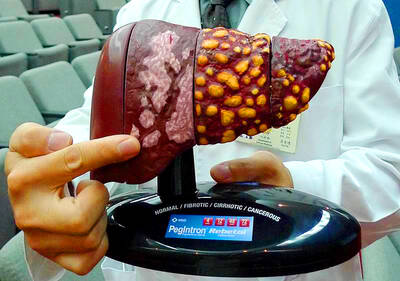The Taipei City Physicians’ Disciplinary Committee has decided not to take disciplinary action against nine doctors at National Taiwan University Hospital who transplanted five organs from a donor with HIV last year, Taipei City’s Department of Health said yesterday, insisting that systemic flaws were to blame for the incident.
The nine doctors, led by Ko Wen-je (柯文哲), the hospital’s intensive care unit chief and former director of the hospital’s organ transplant task force, transplanted the organs from an HIV-positive donor to five patients in August last year, putting the five recipients at high risk of contracting HIV and sparking public outrage over the case.
The committee, instructed by the Department of Health to launch a probe into the doctors’ responsibility for the case in accordance with the Physicians Act (醫師法), discussed the case on June 11 and decided the nine doctors did not violate the law, as they had no knowledge about the HIV-positive donor’s status at the time they performed the surgery.
Administrative flaws and human error were to blame for the incident, as most hospitals send a text message to the doctor or team in charge to inform them of such risks or results, but the hospital’s medical staff had failed to do so, the department’s chief secretary Jiang Yu-mei (姜郁美) said yesterday in explaining the committee’s decision.
“The Physicians Act states that doctors are liable to disciplinary action if they deliberately make serious or repeated mistakes. In this case, the doctors did not deliberately transplant HIV-infected organs, and they performed the surgeries following standard procedure,” she said.
In response to concerns about the doctors not being held accountable in the case, Jiang said the local prosecutors’ office has also launched an investigation into the incident to determine if the hospital or doctors were involved in administrative errors in the case.
Organ transplant coordinators, who were responsible for informing the transplant team of the organ test results, are also under investigation for allegedly informing the team that the organs had tested negative for HIV.
The hospital has been allowed to continue performing organ transplants while the investigation continues. However, the Department of Health investigative report suggested that the hospital needed to enforce training for organ transplant and donation teams and strengthen team cooperation.
So far, none of the five organ recipients or transplant team members has tested HIV-positive.
Jiang said that if any of the five recipients offered new evidence against the doctors, the committee would launch a new probe into the case.

The Taipei Summer Festival is to begin tomorrow at Dadaocheng Wharf (大稻埕), featuring four themed firework shows and five live music performances throughout the month, the Taipei Department of Information and Tourism said today. The festival in the city’s Datong District (大同) is to run until Aug. 30, holding firework displays on Wednesdays and the final Saturday of the event. The first show is scheduled for tomorrow, followed by Aug. 13, 20 and 30. To celebrate the 30th anniversary of Disney Pixar's movie Toy Story, the festival has partnered with Walt Disney Co (Taiwan) to host a special themed area on

Aftershocks from a magnitude 6.2 earthquake that struck off Yilan County at 3:45pm yesterday could reach a magnitude of 5 to 5.5, the Central Weather Administration (CWA) said. Seismological Center technical officer Chiu Chun-ta (邱俊達) told a news conference that the epicenter of the temblor was more than 100km from Taiwan. Although predicted to measure between magnitude 5 and 5.5, the aftershocks would reach an intensity of 1 on Taiwan’s 7-tier scale, which gauges the actual effect of an earthquake, he said. The earthquake lasted longer in Taipei because the city is in a basin, he said. The quake’s epicenter was about 128.9km east-southeast

BE CAREFUL: The virus rarely causes severe illness or death, but newborns, older people and those with medical conditions are at risk of more severe illness As more than 7,000 cases of chikungunya fever have been reported in China’s Guangdong Province this year, including 2,892 new cases last week, the Centers for Disease Control (CDC) yesterday said it is monitoring the situation and considering raising the travel notice level, which might be announced today. The CDC issued a level 1 travel notice, or “watch,” for Guangdong Province on July 22, citing an outbreak in Foshan, a manufacturing hub in the south of the province, that was reported early last month. Between July 27 and Saturday, the province reported 2,892 new cases of chikungunya, reaching a total of 7,716

STAY VIGILANT: People should reduce the risk of chronic liver inflammation by avoiding excessive alcohol consumption, smoking and eating pickled foods, the physician said A doctor last week urged people to look for five key warning signs of acute liver failure after popular producer-turned-entertainer Shen Yu-lin (沈玉琳) was reportedly admitted to an intensive care unit for fulminant hepatitis. Fulminant hepatitis is the rapid and massive death of liver cells, impairing the organ’s detoxification, metabolic, protein synthesis and bile production functions, which if left untreated has a mortality rate as high as 80 percent, according to the Web site of Advancing Clinical Treatment of Liver Disease, an international organization focused on liver disease prevention and treatment. People with hepatitis B or C are at higher risk of